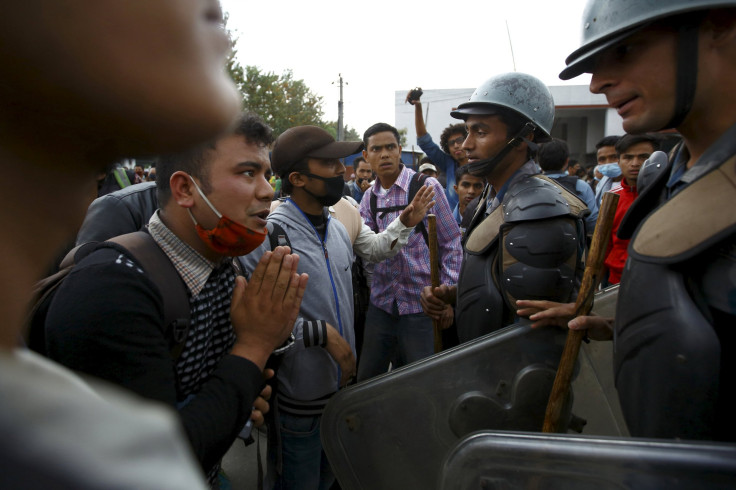Nepal Earthquake Update: Panic, Lack Of Aid Trigger Mass Exodus From Kathmandu

Hundreds of thousands of people have fled the Nepali capital of Kathmandu amid fears of a massive breakdown in law and order. While the death toll from Saturday’s devastating earthquake has now crossed 5,000, riot police have been deployed on the city's streets to prevent looting and to hold back crowds wanting to leave the capital, according to media reports.
A report by the Associated Press (AP) estimated that at least 27 people have so far been detained by police in Kathmandu for stealing from abandoned houses. Four others were reportedly arrested for spreading rumors about another impending earthquake.
“I am hoping to get on a bus, any bus heading out of Kathmandu. I am too scared to be staying in Kathmandu,” Raja Gurung, a Kathmandu resident, told the AP, while leaving for his home in West Nepal. “The house near my rented apartment collapsed. It was horrible. I would rather leave than a live life of fear in Kathmandu.”
Officials have reportedly estimated that 100,000 people have already left the capital and the number could reach up to 300,000 in the coming days. The mass exodus has led to a breakdown of transportation facilities in the region, and has angered people gathered at bus stations across the city.
“We have been waiting since dawn. They told us that there would be 250 buses coming but we haven't seen any of them,” Kishor Kavre, another resident of Kathmandu, told Agence France-Presse (AFP).
Meanwhile, five days after the devastating earthquake, authorities and rescue workers are still struggling to ensure the delivery of aid to remote regions in the country.
“The terrain is such that very remote areas take a very long time to reach and without being there physically we won't be able to reach them, help them, rescue them,” Jagdish Chandra Pokherel, a spokesman for Nepal's army, told the BBC.
The government of the impoverished nation also acknowledged that “some weaknesses” have been found in managing the relief operations. “We will improve this from Wednesday,” Nepal’s Communication Minister Minendra Rijal reportedly said late on Tuesday.
The United Nations has released $15 million through its Central Emergency Response Fund to enable aid agencies to scale up their operations. According to U.N. estimates, 8 million people across 39 districts have been affected by the quake, which is the worst the country has witnessed in the last eight decades.
© Copyright IBTimes 2024. All rights reserved.












